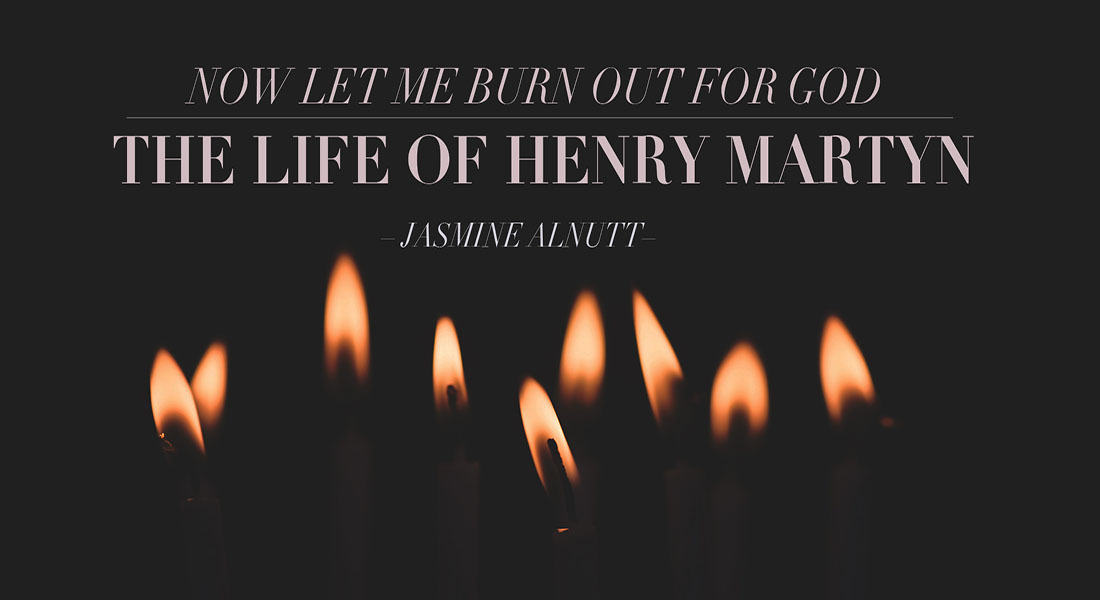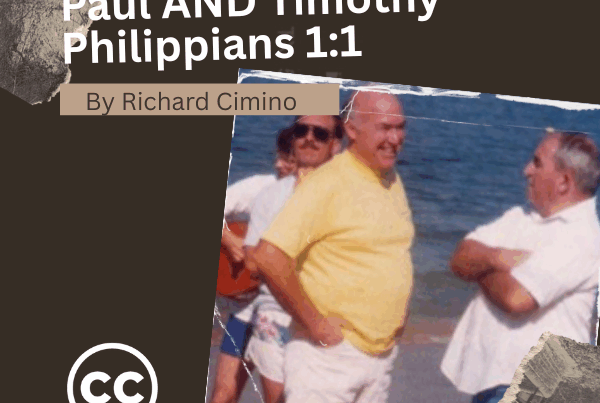
“Now let me burn out for God.” This was the impassioned prayer of a young Cornishman named Henry Martyn (1781-1812), missionary to India and Persia, a man who lived his short life with a sense of urgency that is rare in our generation.
Martyn was born in the town of Truro in the beautiful Cornwall region of southern England. Although he was a rather small and frail boy, he possessed a keen intellect, and his academic skill eventually made him a promising Cambridge scholar. When his father died suddenly in January 1800, Martyn was confronted with eternal, spiritual realities. He began to read the Bible, and soon after surrendered his life to Jesus Christ. His conversion was genuine, but as a young student at a prestigious university he was naturally drawn to a life of academic prominence, financial stability and leisure. He honestly confessed, “I could not consent to be poor for Christ’s sake.”
However, Martyn was surrounded by strong Christian influences and began to spend more and more time reading his Bible.
In fact, he began to treasure his times of solitude with God more than anything else.
His biographer insightfully observed, “A man cannot yield himself to such Companionship without being molded by it.”¹ What’s more, in his final year at Cambridge he was captivated by the writings of David Brainerd, an early missionary to the American Indians. Martyn experienced a total paradigm shift; this young man who claimed he could never be poor for Christ’s sake now felt compelled to forsake a prestigious career in order to become a missionary himself. He wrote, “I almost think that to be prevented going among the heathen as a missionary would break my heart.”
“I feel pressed in spirit to do something for God….I have hitherto lived to little purpose, more like a clod than a servant of God; now let me burn out for God.”
“I feel pressed in spirit to do something for God….I have hitherto lived to little purpose, more like a clod than a servant of God; now let me burn out for God.” What a testament to the transforming power of God and His Word!
This was not a decision Martyn made lightly, particularly when so many people thought he was throwing his life away, “Martyn’s decision startled his world almost as much as if he had proposed a flight to the moon.”² Yet he stated, “The flesh shrinks at times, but I do not regret having resigned the world…. Life is but a short journey, and then if I be faithful unto death, my gracious reward will begin.”
His sense of spiritual urgency drove him forward.
Martyn spent the next two years as curate of a church in Cornwall in preparation for missionary service in India. He began to develop an interest in Eastern languages; in fact, an Eastern grammar book was usually his “light reading” to relax with in the evening!
Because of his weak constitution and natural inclination toward comfort, he determined to practice self-denial and discipline himself in preparation for service: “I resolved on my knees to live a life of far more self-denial than I had ever yet done, and to begin with little things. Accordingly I ate my breakfast standing at a distance from the fire, and stood reading at the window during the morning, though the thermometer stood at freezing-point….To climb the steep ascent, to run, to fight, to wrestle was the desire of my heart.”
In addition to his preparations, Martyn found something else to absorb his interest at this time—a woman named Lydia Grenfell. He quickly fell in love with her, but because of his calling to India he hesitated to declare his feelings. She seemed interested in him as well, but because of a previous relationship she was reluctant to move forward, even after Martyn went to India and asked her to marry him and join him there. Sadly, after Martyn left they never saw each other again, although Martyn’s love for Lydia endured his entire life.
Martyn desired to go to India as a simple, poor missionary, but he needed to make sure his unmarried sister was provided for, so he agreed to be a chaplain for the East India Company. He sailed for India in the summer of 1805, where he studied and preached in Calcutta before going to Serampore to spend time with William Carey and his team. During this time he was greatly encouraged in his calling as a Bible translator.
Martyn was eventually sent to the towns of Dinapore and Cawnpore to serve as chaplain to the Company employees and soldiers in the area. The European community was very skeptical and uncomfortable with Martyn because of his religious “enthusiasm” and his desire to reach out to the Indian people. Yet he defiantly stated, “The more men speak of the impossibility of converting a native, the more will God’s power be displayed in bringing it to pass.”
And so, undaunted by the criticism and arrogance of his peers, he ministered to sick soldiers and invited poor people into his home; in fact, when he was given a larger house, he filled it with an assortment of characters—scribes, language tutors and translators who worked with him, as well as soldiers, beggars and others! Sure enough, because of his integrity and example, some of the hard-hearted Europeans in his congregation began to change.
Always desiring to redeem the time, Martyn opened four primary schools in the area to teach children to read and write Hindustani (modern day Urdu). He worked to provide Urdu with a standardized body of literature, and his work laid a foundation in Urdu translation for others to follow.
Word spread concerning Martyn’s language proficiency, and he was asked to produce an Urdu and Persian New Testament translation. He worked tirelessly on these translations, spending hours and hours in study. Even his free time was often occupied with study; in fact, his friend’s wife wrote that she was afraid to ride with him in his carriage because he would read while he drove, nearly killing them on one occasion! Here was a man who wasted no time!
Martyn was never a captivating, powerful speaker, and as tuberculosis began to take hold of him, preaching became painful. Yet he kept on, and even began to preach to beggars at his house. He wrote, “Study never makes me ill—scarcely ever fatigues me—but my lungs! Death is seated there; it is speaking that kills me. But the call of Jesus Christ bids me cry aloud, and spare not.”
In fact, he declared that he would rather preach the gospel to the poor in a way they understood than anything else on earth!
However, as the symptoms of tuberculosis escalated, Martyn decided he must go to Persia to translate the Persian New Testament before he died. In November 1810 he preached his last sermons in Cawnpore before departing. He wrote, “If I live to complete the Persian New Testament, my life after that will be of less importance. But whether life or death be mine, may Christ be magnified in me. If He has work for me to do I cannot die.” Martyn was in Persia a year and a half, during which time he worked on the New Testament translation and spent time interacting and debating with Muslims.
Martyn was known for his profound confidence in the Scriptures. He was absolutely convinced that the power of God’s Word could convert any soul. He believed that any other religious text—like the Quran—would be cast aside when compared with the powerful truths of Scripture. He therefore proclaimed the Gospel in complete confidence and boldness, sometimes in the face of intense hostility; however, because he had come to understand Muslim culture so intimately, he spoke with great respect and understanding as well. He wisely said, “I lay not much stress upon clear arguments; the work of God is seldom wrought in this way. To preach the gospel with the Holy Ghost sent down from heaven is a better way to win souls.”
Sadly, Martyn’s health further declined in Persia; and yet instead of lamenting over his condition, he worked with an even greater sense of urgency to complete his New Testament translation and present it to the Shah, whose approval would legitimize the Book in the eyes of the Persians and allow for its circulation. The British Ambassador was able to gain this approval for Martyn in May 1812, and he arranged to have it printed as well.
Around this time, Martyn received a letter from Lydia and decided that since his work was now done he would try to get back home to Cornwall; yet the journey proved to be more than his weak body could handle. On October 8, 1812, as he lay dying, he wrote, “I sat in the orchard, and thought with sweet comfort and peace of my God; in solitude my Company, my Friend and Comforter. Oh, when shall time give place to eternity! When shall appear the new heaven and new earth wherein dwelleth righteousness! There shall in no wise enter in anything that defileth.” Martyn passed into eternity the following week, October 14, 1812.
Although the life of Henry Martyn was brief, it was a life utterly invested in eternity, and therefore a life of enduring fruitfulness. Because he devoted himself to his relationship with Jesus Christ, and perhaps because he knew his life might be short, he lived with a sense of spiritual urgency that is at once inspiring and convicting for us today. As Reverend G.C.B. Davies put it: “He was always conscious that his life might be short; yet he could face the fact of death in the assurance that this hour would not come until his work was completed. Thus it was he could pray: ‘Increase my zeal that though I am but a feeble and obscure instrument, I may struggle out my few days in great and unremitting exertions for the demolition of paganism, and the setting up of Christ’s kingdom.”³
Surely Martyn is a compelling example of Paul’s exhortation to the Ephesians: “See then that you walk circumspectly, not as fools but as wise…redeeming the time” (Ephesians 5:15-16). May the life and prayer of Henry Martyn become ours, that our greatest passion will be to live with the urgency that will “burn out for God.”
¹ Constance Padwick, Henry Martyn: Confessor of the Faith
² Ibid
³ Ibid






